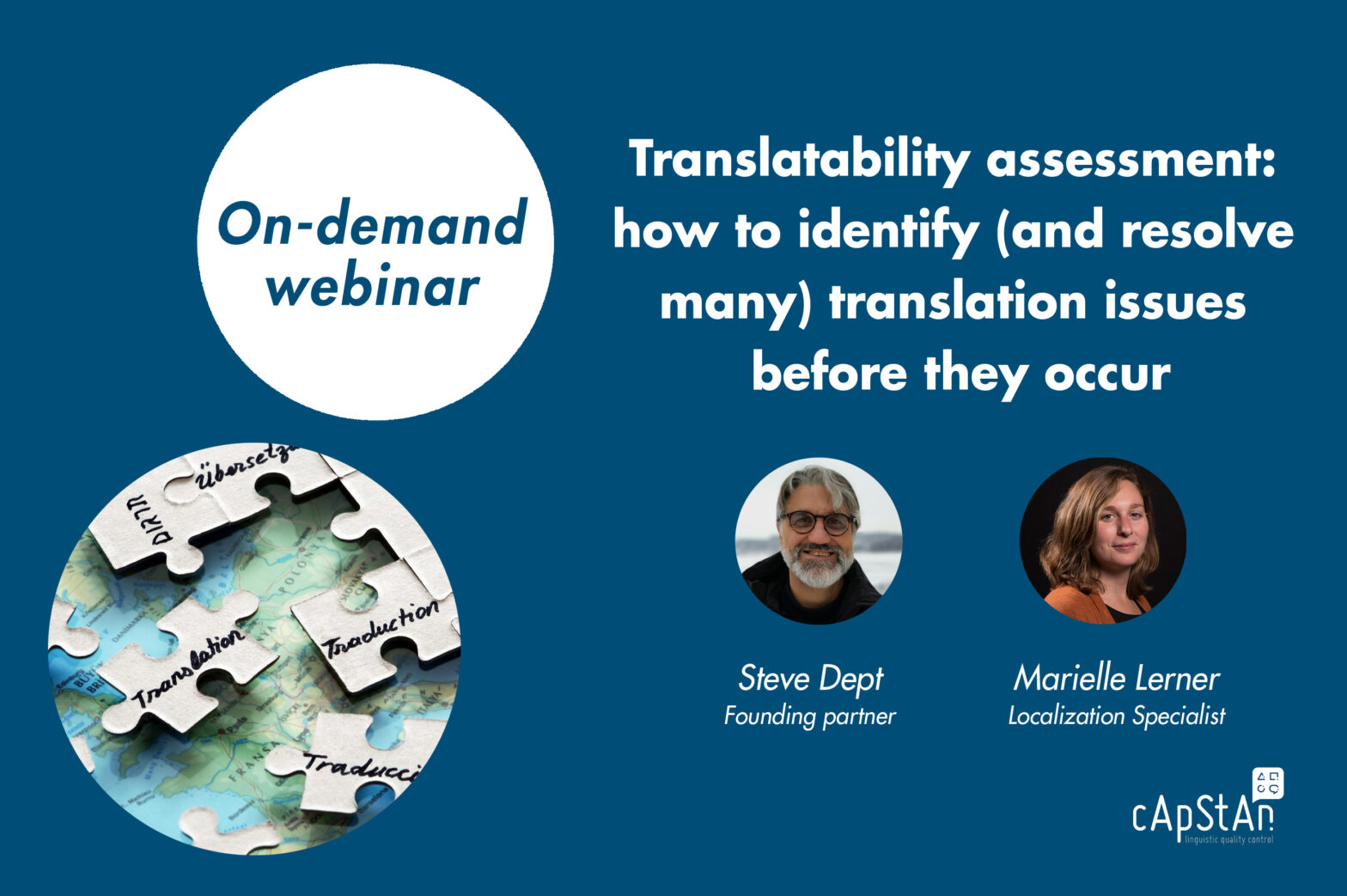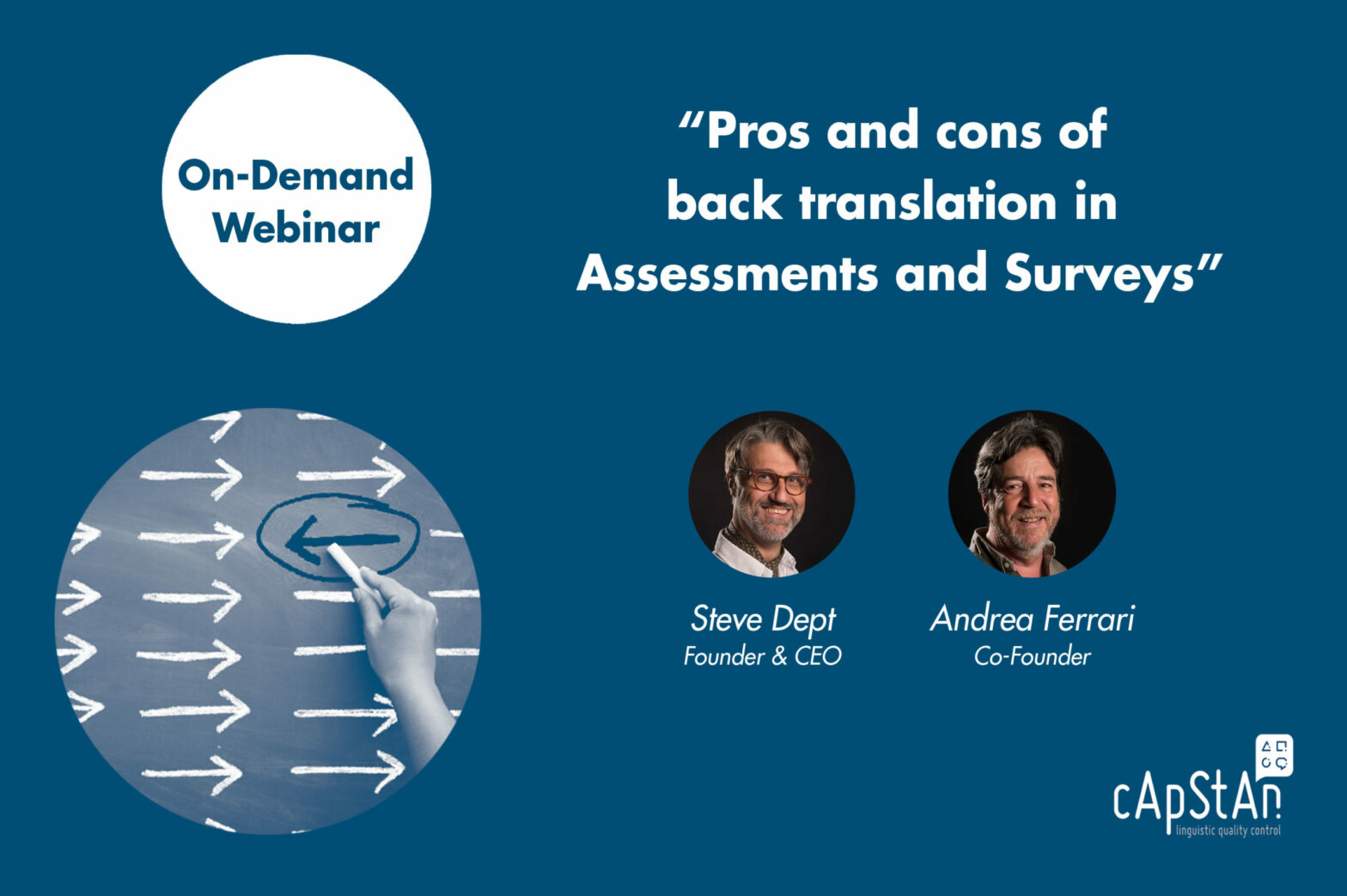Category Archives: Tests and Assessments

Why involving language services providers (LSPs) in the translation platform design is important
by Roberta Lizzi – Senior project manager, external human resources director When multinational surveys and assessments go digital, content creators, principal investigators or test owners tend to rely on platforms, not only for delivery, but also for the management of the translation process. These platforms can be off-the-shelf or developed in-house. As a consequence, language …
“Why involving language services providers (LSPs) in the translation platform design is important”
Read More
Diversity, Equity, Inclusion & Bias Reduction Consultancy
Looking at standardized tests and questionnaire content through the lens of Diversity, Equity, Inclusion and Bias Reduction (DEI-BR) Standardized tests and questionnaires are used in a variety of contexts such as admission to university, certification, accreditation, or hiring. Fairness, validity and reliability are objectives that every testing organisation strives to address. The processes in place …
“Diversity, Equity, Inclusion & Bias Reduction Consultancy”
Read More
Do SMEs and Linguists mix like Water and Oil?
by Steve Dept, Founding Partner The idiom “these folks mix like water and oil” usually refer to an insuperable difficulty for certain people to blend and see eye to eye with one another. When we were asked to verify the translation of assessments for which it was obvious that linguists alone would not have the …
“Do SMEs and Linguists mix like Water and Oil?”
Read More
cApStAn’s new website has launched!
Et voilà! We are now online! After months of hard work we are delighted to announce the launch of our new website, which reflects our mission, values and brand, and showcases the best of our linguistic services and the great team behind it all. The new features are tailored to help you find the right …
“cApStAn’s new website has launched!”
Read More
Translatability and Cultural Suitability Workshops for Test Authors
Steve Dept, cApStAn CEO It may take a psychologist or a subject matter expert to be a test author and develop good questions, but nothing speaks against that person being monolingual, right? It doesn’t prevent them from doing a sterling job. Anglo-Saxon items writing practices have dominated the assessment universe for over half a century, …
“Translatability and Cultural Suitability Workshops for Test Authors”
Read More
How to best approach the translation and adaptation of tests and surveys for gendered languages
by Pisana Ferrari – cApStAn Ambassador to the Global Village Standardized tests and assessments are used in a variety of different contexts: admission to schools and universities, professional certifications, hiring, or collecting information about background variables, for example, and can come in more than one language. In this case, test or assessment developers will need …
“How to best approach the translation and adaptation of tests and surveys for gendered languages”
Read More
cApStAn in Paris at a FLIP+ meeting, a space to share knowledge and best practices in e-assessments
cApStAn co-founder Steve Dept was in Paris on June 9-10, 2022, at a meeting of the FLIP+ Association, a group of public institutions who switched from pencil-and-paper to computer-based assessment (CBA) for their national examinations, or who are introducing digital central assessments for the first time. The acronym? The first four participants were France, Luxembourg, …
Read More
Disentangling Proficiency in Programming from Proficiency in English: Codility meets cApStAn
by Pisana Ferrari – Branding and Social Media Manager If the level of language proficiency of a skills assessment is too high, this may hamper the correct measuring of these very skills. For example, a skilled programmer may not pass a test due to the high threshold of English proficiency that is required in order …
“Disentangling Proficiency in Programming from Proficiency in English: Codility meets cApStAn”
Read More
On-Demand Webinar | Disentangling Proficiency in Programming from Proficiency in English: Codility Meets cApStAn
Codility is the #1 rated recruitment platform for developers, helping world-class companies the likes of Microsoft, Intel and American Express to assess candidate programmers via skills-based coding tests. The tests are administered in English, but often the candidates are not native English speakers. Hence the “pain point” identified by Codility: a too high level of …
Read More
How can you create culturally fair content for tests and surveys?
by Marielle Lerner – Localization Specialist Lost in adaptation If you are involved with the production of international surveys or assessments, you have likely observed the “lost in translation” phenomenon in action. On the other hand, you may have never heard the expression “lost in adaptation”, something that we at cApStAn are always thinking about …
“How can you create culturally fair content for tests and surveys?”
Read More
On-Demand Webinar |Translatability Assessment
A translatability assessment (TA) is a tried and tested method to optimize the master version of your assessment or survey questionnaire before the actual translation and adaptation process begins. In many multilingual tests or surveys—not only PISA or PIAAC or Pew Research Center’s Global Attitudes Project—the TA has become an important design step. The TA process increases …
“On-Demand Webinar |Translatability Assessment”
Read More
On-Demand Webinar| Pros and cons of back translation in assessments and surveys
Pros and cons of back translation in assessments and surveys A webinar by Andrea FERRARI and Steve DEPT, the founders of cApStAn Linguistic Quality Control. In 45 minutes, they will tell you everything you always wanted to know about back translation but never dared to ask such as: Telling examples from international studies – for which Andrea and Steve were commissioned …
“On-Demand Webinar| Pros and cons of back translation in assessments and surveys”
Read More